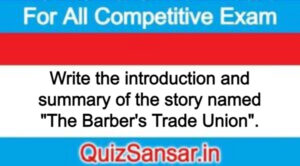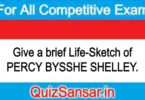
Write the introduction and summary of the story named “The Barber’s Trade Union”.
Write the introduction and summary of the story named “The Barber’s Trade Union”.
Ans.
Introduction
In the Barber’s Trade Union, Mulk Raj Anand, the novelist, deals with the theme of class, appearance, alienation, arrogance, ingenuity, independence, admiration, respect, control and freedom. The story is taken from his selected short stories collection. The story is narrated in the first person by a young unnamed boy and after reading the story. the reader realizes that Anand may be exploring the theme of class. Chandu is considered to be of lower caste or class than other people in the village. It is as though he is being judged solely on the fact that both he and his father are barbers. The content of their characters is not taken into consideration rather a traditional hierarchy is imposed by those of a higher caste. The simple matter of Chandu changing his clothes to a style that he prefers is also frowned upon by those in the village who are of a higher caste. This may be important as those of a higher caste may be suggesting that Chandu has no right to dress as he does because he belongs to a lower caste. Something that some readers might find unusual considering that Chandu is only trying to improve his appearance that others feel threatened and as such alienate Chandu. This leads Chandu to form a barber’s trade union to take revenge upon his oppressors.
Summary of the Story
At a tender age. Chandu embarks upon full fledged domestic responsibility. Every morning Chandu has to make errands to the notable in the village for shaving and haircutting. All goes well and the set ordered is not disturbed unless Chandu starts going to Taluka for transacting business. He observes certain novelties there, particularly the rig out of doctor Kalam Khan, a white turban, a white rubber coat and a leather bag in hand. He is uncontrollably fascinated towards the apparel. He has attraction for medical profession as he has bequeathed some medical tips and snippets from his father. Chandu’s new attire brings about great glamour and chaos in the village. When he approaches the landlord’s house, the landlord, an ideologue of dogmatism and orthodoxy, having seen Chandu in the new robe, mortifies Chandu in the foulest terms. The landlord reprimands calling Chandu “son of a pig ? Get out? Get out!…you will defile my religion.” It is a fact that innocent low caste people like Chandu are always treated with humiliation for no fault of theirs. Did Chandu commit any blemish or blunder by wearing a dress like doctor Kalam Khan’s?
The conservative society always prefers injustice and oppression. Chandu is impelled to realize that due to his being a low caste boy, he is not entitled to such felicity and that he is perpetually harnessed to serve the upper caste society. This is his ineradicable destiny and that he is bound to be in it. The village Sahukar, too, goes one step ahead and deals with Chandu in harshest possible terms-“You little swine, you go on disguising yourself as a clown…” Pandit Parmanand, the keeper of the village shrine, also bullies saying “He is a low caste devil! He is a rogue !” Chandu is thoroughly humiliated and exasperated at this treatment. There is a distinct discrepancy between Chandu and Mulk Raj Anand’s other protagonists like Bakha and Munoo. They would have witted. submitted and succumbed to the circumstances as normal creatures of circumstance would have. But Chandu is entirely unlike them. He is one in hundreds and hundreds in one. He is intent on topsy surveying everything orthodox. He is a representative of the modern man in the modern world. Chandu, insulted and affronted though, instead of giving into the village superiors, adopts a course of action with a view to teaching the idiots a lesson.
His course of action is a course of revolt. He desires to change his fate and fate of his fellow brothers by way of overcoming his predicament. Despite his being a mere barber boy, he has prowess to outwit and outsmart others. With a view to teaching the orthodox idiots a lesson, he ceases to dance attendance to the village notables and others for shaving and hair-cutting. Instead, he frequents the town for earning. Within a few days. the outcome is easily visible, causing a great problem and inconvenience. Chandu is so shrewd and cunning that he has already had his verka counterpart in his league.
The result is that the landlord looks hoary and his wife has even threatened to leave him. The Sahukar looks like a leper with the brown tinge of tobacco on his moustache. The elders in the village become a stock subject of laughter. Chandu very conveniently succeeds in his plan of non co-operation. The villagers reel under the new situation while Chandu makes hay in the town. He summons all the barbers in the purview of seven miles and convinces them that it was high time that all the elders came to them and that they must stop dancing attendance to them. And thus, they launch into ‘Rajkot District Barber Brothers Hair Dressing and Shaving Saloon and thus become the harbinger and herald of the new era of freedom and justice. Chandu’s victory assumes greater significance especially in the backdrop of the orthodox and inhuman traditions in the Indian society.
His triumph restores sanity to the situation. It is not a win which belongs only to Chandu. It is victory of justice, parity, morality and rejuvenation of human dignity.
-
Write the critical appreciation of the poem No. 12 entitled Far Below Flowed.
-
Write the critical appreciation of the poem No. 11 entitled Leave this Chanting.






